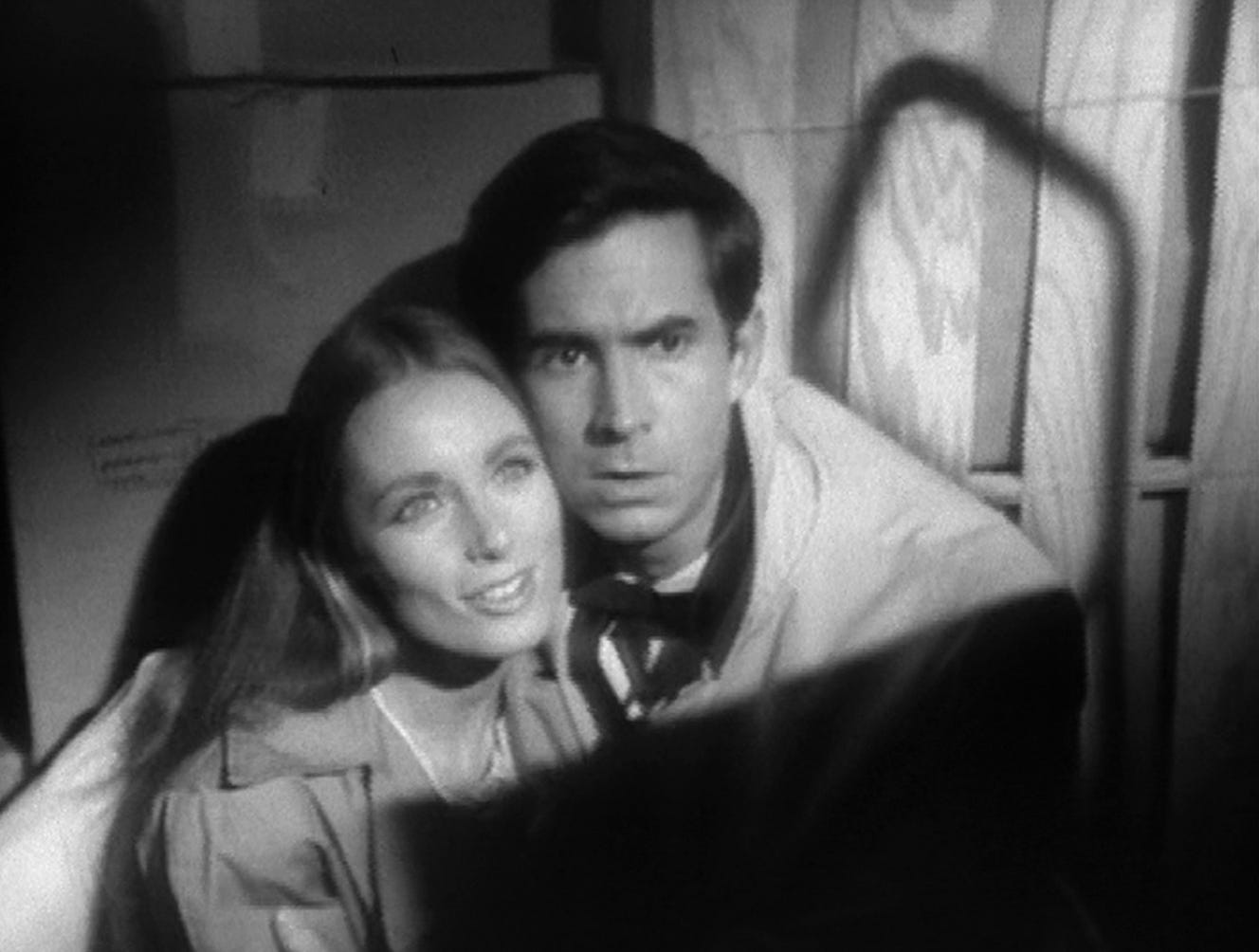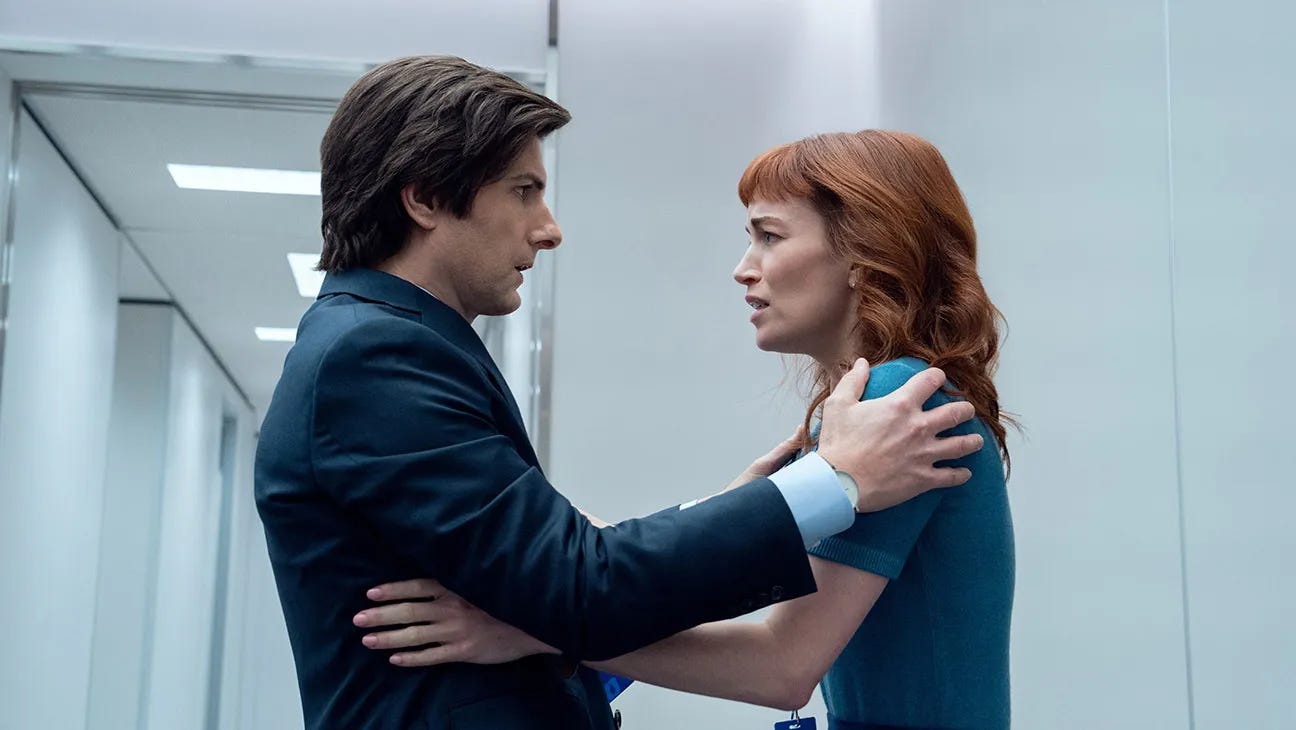As many of us count down the days until Severance’s season two finale, another story of entrapment and escape beckons from the past. Long before the hit Apple TV+ show trapped its workers in an endless labyrinth of fluorescent-lit corridors, Stephen Sondheim and James Goldman imagined a different kind of imprisonment in their 1966 made-for-television musical Evening Primrose—one hidden behind the locked doors of a department store, where the night never ends.
In Severance, workers at the mysterious Lumon Industries undergo a surgical procedure that splits their consciousness in two: their “outie” lives their normal life but has no memory of work, while their “innie” exists only within Lumon’s stark white corridors, never experiencing the outside world. For these office-bound selves, life begins and ends at the elevator doors, their entire existence confined to fluorescent-lit halls and windowless rooms.
Evening Primrose tells an equally unsettling tale of voluntary confinement. Charles Snell, a poet disillusioned with modern life, makes a radical decision: to secretly live in a department store after hours. But he soon discovers he’s not alone. A hidden society of “Dark People” already inhabits this shadow world, emerging only after the store closes and the last customer leaves. Like Severance’s “innies,” these nocturnal residents experience a peculiarly limited existence—one where daylight becomes a distant memory, and the outside world might as well not exist at all.
Sondheim Candlelight Concerts:
a special offer courtesy of TodayTix
On March 22nd (which would have been Sondheim’s 95th birthday), TodayTix presents Sondheim: Strings by Candlelight in both New York City and London. Sondheim + a string quartet + a beautiful setting… what could be better? I’m thrilled to say that Sondheim Hub readers receive an exclusive 15% discount on tickets in both cities! Follow these links for NYC and London, and use the code HBDSONDHEIM.
The psychological impact of this (in)voluntary confinement emerges most powerfully in Evening Primrose’s “I Remember,” where Ella, a young woman who has lived in the department store since childhood, recalls—or tries to recall—the outside world. “I remember sky,” she sings, “It was blue as ink / Or at least I think / I remember sky.” Her increasingly uncertain memories mirror the existential questions that haunt Severance’s office-bound innies, who have never seen the sky at all. Both works explore how isolation warps reality itself—how confinement doesn’t just restrict movement, but reshapes consciousness.
In Severance, Lumon’s employees are taught to view their restricted world as a privilege—a chance to achieve work-life balance in its most extreme form. Similarly, Charles Snell at first sees his department store sanctuary as liberation: “What a place to live, what a place to write!” His anthem “If You Can Find Me I’m Here” begins as a celebration of escape—“I am free! I am free!”—but, like Lumon’s corporate rhetoric about “serving Kier” (Lumon’s venerated, near-deified founder), this repeated insistence on freedom only underscores its absence. “Master of all I survey,” Charles declares, even as his kingdom shrinks to “the barest essentials a poet would need.”
Particularly compelling is how both works use romance to crack these carefully constructed worlds of isolation. In Evening Primrose, the growing connection between Charles and Ella threatens the strict rules of their nocturnal society. Their duet “When?” captures both the yearning and the danger of their situation: “One heart is beating wildly / Can she hear it?” Charles sings, while Ella responds with questions that reveal her limited understanding of the outside world: “What is a party? What is a joke?” Their attempts to connect must be hidden from the watchful eyes of the “Dark People,” just as Severance’s characters must navigate their own forbidden attractions and intimate bonds. In the sterile maze of Lumon, where corridors stretch like an endless puzzle, bonds form with a quiet urgency—tentative, dangerous, and all the more precious for their fragility.
Human connection, in both works, becomes both salvation and liability.
As their respective stories unfold, each work grapples with a radical unraveling of the self. Ella’s plaintive “Take Me to the World” could easily be the anthem of Severance’s innies as they begin to question their situation. “Let me see the world with clouds,” she begs, “Take me to the world / Out where I can push through crowds.” Her desperate plea for authentic experience—“Take me to a world where I can be alive”—echoes the fundamental horror at the heart of both works. For Ella, like Charles, the price of voluntary exile becomes unbearable; for Severance’s innies, the horror lies in discovering they’re living someone else’s choice to escape, their consciousness severed and trapped in an endless workday while their other selves enjoy the very world they’re denied. This existential trauma—being forced to bear the consequences of a decision they never made—adds a layer of violation beyond mere confinement.
Charles’s response to Ella’s plea reveals the terrible logic that underpins both worlds. “The world is better here,” he insists, “I know, I’ve seen them both.” His rejection of the outside world as “mean and ugly” echoes the motivations of Severance’s outies, who choose to split their consciousness. Mark (Adam Scott) undergoes the severance procedure after a loss, in the throes of grief. Others flee their own demons: the weight of family legacy, the aftermath of trauma, the grinding exhaustion of modern life. Like Charles abandoning his “blood-sucking landlords” and “neanderthal neighbors” for his department store sanctuary, these characters choose to partition away their pain—creating imprisoned selves who pay the price for their desire to escape. But both works suggest that this attempt to create a safer, more controlled existence comes at an unbearable cost.
Both Evening Primrose and Severance understand that the true horror of imprisonment lies not in locked doors, but in the systems and societies that emerge to maintain them. The “Dark People” who rule the department store’s nocturnal world enforce their dominion through chilling means: anyone who threatens their secret existence is transformed into a mannequin, frozen in an eternal display of commercial perfection. This fate looms over Charles and Ella’s romance, lending desperate urgency to their whispered exchanges between the aisles.
Lumon’s methods of control are more corporate but no less sinister. The severed floor operates through a byzantine system of reward and punishment, where employees are simultaneously infantilized and terrorized. They sort “scary” numbers into boxes without understanding why, celebrate with waffle parties, and live in fear of the “break room.” Severance, like Evening Primrose, suggests that any attempt to create a perfect, controlled environment seems to require perfect, controlling violence to maintain it.
The most unsettling aspect of both stories is their blurring of the line between sanctuary and prison. Charles’s initial delight at making the department store his home—“Everything gets to be mine to own / Mine to use / Mine to write all the poems I choose”—gradually reveals itself as a kind of madness, just as Lumon’s cheerful corporate aesthetic masks something more sinister. In both cases, the artificial brightness of these spaces—whether department store displays or office fluorescents—serves only to deepen the shadows they cast.
This horror reaches its peak when characters begin to question their reality. Ella’s increasingly uncertain memories of the outside world find their echo in the existential questions that plague Severance’s innies. What is real? What lies beyond these walls? And most crucially: who are they, really, in these manufactured worlds? The answer, both works suggest, is that you cannot partition reality without also fragmenting yourself.
The tragic irony at the heart of both works is that their characters’ attempts to escape life’s complexities only lead them to create more elaborate, more terrifying ones. The “Dark People” of Evening Primrose have developed their own rigid social structure, complete with traditions, hierarchies, and brutal punishments—a funhouse mirror version of the society they fled. Lumon’s severed floor, with its mysterious departments and byzantine protocols, hasn’t eliminated workplace politics and social dynamics; it’s merely distilled them into something more pure and dangerous.
“Let it be a world with you,” Ella pleads with Charles in “Take Me to the World,” understanding that any refuge becomes a prison when it denies us authentic human connection. Her song transforms from a plea for escape into something more profound: a recognition that we can only truly live by engaging with the world in all its messiness. The innies of Severance reach a similar conclusion, discovering that the very memories and emotions they were created to escape are essential to their humanity.
Perhaps what makes both Evening Primrose and Severance so compelling is how they dramatize a fundamentally human temptation: the simple desire to opt out. To opt out of pain, of responsibility, of life’s inherent difficulties. Charles seeks refuge from a world of “despoilers of beauty” in his department store kingdom; Lumon’s employees choose to partition away the tedium of every workday. But in both cases, we learn that such escape proves impossible. The world, in all its messy complexity, will always find its way in.
That Sondheim and Goldman explored these questions of fractured identity and manufactured realities decades before our current obsessions with digital dualism and work-life boundaries speaks to their prescience. As so often, we see that Sondheim’s work doesn’t just endure; it anticipates.
Evening Primrose and Severance hold up a dark mirror to our own impulse for escape. We recognize in these works our own fantasies of withdrawal from an imperfect and often painful world. But the lesson of both works is that such withdrawal exacts a terrible price. Whether in a department store’s endless night or an office’s perpetual workday, we cannot partition ourselves from life without becoming something less than fully alive. The mannequins guarding Primrose’s nocturnal world and the smiling corporate portraits watching over Lumon’s employees serve as warnings: in trying to escape the world’s ugliness, we risk becoming frozen ourselves—perfect, preserved, and utterly devoid of the very humanity we sought to protect.





